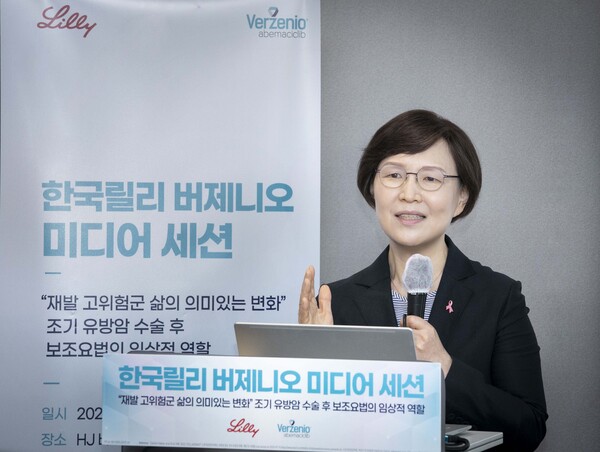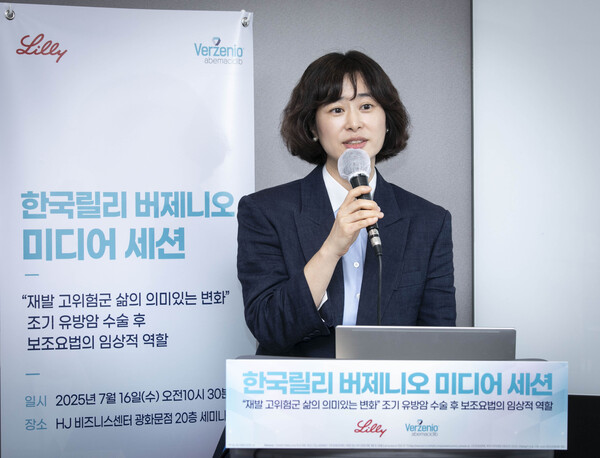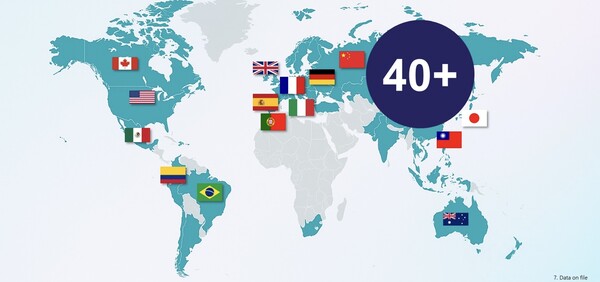
While Eli Lilly’s Verzenio (abemaciclib) continues to rack up global sales on the strength of its unique adjuvant breast cancer approval, one major market remains out of reach: Korea.
More than two years after regulatory clearance, the drug still lacks reimbursement for high-risk early breast cancer. This is despite five-year data showing that when combined with endocrine therapy, Verzenio significantly lowers the risk of recurrence and distant metastasis.
Oncologists warn that the delay is costing patients their best chance at a cure.
“Do we really need to wait for these patients to relapse before we act?” said Professor Park Kyong-hwa of oncology and hematology at Korea University, during a Wednesday press briefing hosted by Eli Lilly Korea in Seoul.
Verzenio was approved in 2022 for hormone receptor-positive, HER2-negative, node-positive early breast cancer. But without national reimbursement, patients are left to shoulder the full cost of treatment. A two-year course runs nearly 50 million won, or about $36,000. Many forgo the drug entirely, Park said.
It also remains the only CDK4/6 inhibitor in Korea approved for adjuvant use in this setting. Still, Korea’s Cancer Review Committee and Drug Reimbursement Evaluation Committee (DREC) have twice declined to set coverage criteria. A third submission, filed in January, remains under review with no decision announced.

Lilly Korea says it’s running out of patience. “This is about preventing relapse before it becomes metastatic,” said Kwon Mi-ra, who leads the company’s oncology division. “It’s about saving lives and reducing long-term cost. We’re confident in both the clinical and economic value of Verzenio.”
It is not for lack of clinical precedent. In the phase 3 monarchE trial, Verzenio plus endocrine therapy reduced the risk of recurrence or death by 33 percent over five years, with benefits that continued even after patients completed the treatment.
“This is when micrometastases can take hold,” Professor Park said, referring to the first one to two years after surgery. “That’s the window Verzenio is targeting. And in my practice, we’re seeing fewer patients come back. That silence tells us the drug is working.”
Yet the silence from Korea’s reimbursement authorities, she warned, could prove far more costly.
“From what I understand, Verzenio costs around 50 million won for a full two-year course,” she said. “If the government invests that 50 million won early on, how much benefit does it yield?”
She added, “I suspect the annual cost of treating a single metastatic breast cancer patient exceeds 50 million won.”
About 30 percent of high-risk early-stage patients eventually relapse. When that happens, insurance picks up the cost of years of additional treatment, including targeted drugs and chemotherapy.

“It may be more effective to invest early in high-risk patients rather than adding drugs one by one after metastasis,” Park said.
That argument has taken on growing urgency as Korea’s breast cancer landscape shifts. Since 1990, the country’s incidence rate has surged by 1.6-fold, with early-stage cases more than doubling over the past two decades.
Breast cancer now occurs most commonly in Korean women in their 40s and 50s, a full decade earlier than in many Western countries.
“These are women raising children, working jobs, taking care of families. And they live in constant fear of recurrence.”
Even after treatment ends, that fear lingers. “Some patients come back with back pain and think the cancer has returned,” she said. “Even rainy weather makes them anxious.”
Lilly Korea is leaning on Verzenio’s inclusion in global clinical guidelines and its ability to reduce long-term recurrence. “The clinical rationale is no longer in question,” Kwon said. “It’s time the reimbursement caught up.”
“We’re missing the only chance for cure,” Park added. “For high-risk early breast cancer, adjuvant therapy is the last real opportunity to prevent recurrence and metastasis. Once the cancer returns, survival drops sharply.”
Related articles
- Gilead’s Trodelvy wins Korean coverage for breast cancer -- too late for some and still off-limits up front
- [ASCO 2025] ‘Treatment for relatively younger Korean breast cancer patients should better fit their characteristics’
- ‘Verzenio, a ray of hope for breast cancer patients, should get insurance benefits’
- Daiichi Sankyo's Enhertu passes cancer drug benefit review after patients’ petition
- AZ leads breast cancer treatment market with expanded portfolio
- 'Lilly's Verzenio, a complete cure option for recurrent breast cancer patients'
- If approved, Kisqali will intensify competition in early-stage breast cancer drug prescription
- Lilly’s Jaypirca wins Korea reimbursement for relapsed mantle cell lymphoma
- After celebrity breast-cancer awareness gala, a stage-IV patient lays out Korea’s Ibrance gap

